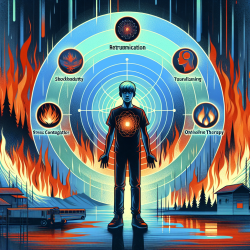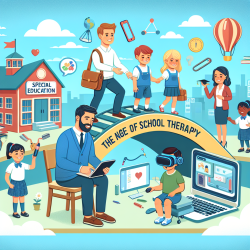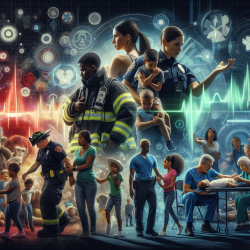The 2016 Fort McMurray wildfire was a devastating event that led to the evacuation of 88,000 residents and burned 590,000 hectares. This mass trauma event provided researchers with a unique opportunity to study its psychological impact on adolescents. A recent study titled "Collective Trauma and Mental Health in Adolescents: A Retrospective Cohort Study of the Effects of Retraumatization" sheds light on how previous trauma can exacerbate mental health issues in such scenarios.
The Study's Key Findings
The study compared two groups of adolescents: those who experienced their most significant trauma during the wildfire and those who had pre-existing trauma before the wildfire. The findings revealed that:
- Adolescents with prior trauma exhibited higher rates of depression and PTSD symptoms compared to those experiencing trauma for the first time.
- There were no significant differences in anxiety levels between the two groups.
- Retraumatization was identified as a critical factor influencing long-term mental health outcomes.
These results suggest that retraumatization can significantly affect adolescents' mental health, highlighting the need for tailored therapeutic interventions.
Implications for Practitioners
The study underscores the importance of trauma-informed care in educational and therapeutic settings. Practitioners can enhance their skills by considering these insights:
- Recognize Retraumatization: Be aware that adolescents with a history of trauma may be more vulnerable to retraumatization during mass trauma events.
- Implement Trauma-Informed Practices: Develop programs that address both individual and collective trauma impacts, ensuring sensitivity to past experiences.
- Foster Supportive Environments: Encourage peer support and community involvement to help adolescents build resilience and cope with stress contagion effects.
The Role of Online Therapy Services
Online therapy services, like those provided by TinyEYE, can play a crucial role in supporting adolescents affected by mass trauma events. These services offer accessible, flexible, and confidential support that can be tailored to meet individual needs. By integrating insights from this study into online therapy practices, practitioners can better address the complex needs of retraumatized youths.
Encouraging Further Research
The findings from this study open avenues for further research into the long-term effects of retraumatization and effective intervention strategies. Practitioners are encouraged to explore these areas to enhance their understanding and improve outcomes for affected adolescents.
To read the original research paper, please follow this link: Collective Trauma and Mental Health in Adolescents: A Retrospective Cohort Study of the Effects of Retraumatization.










